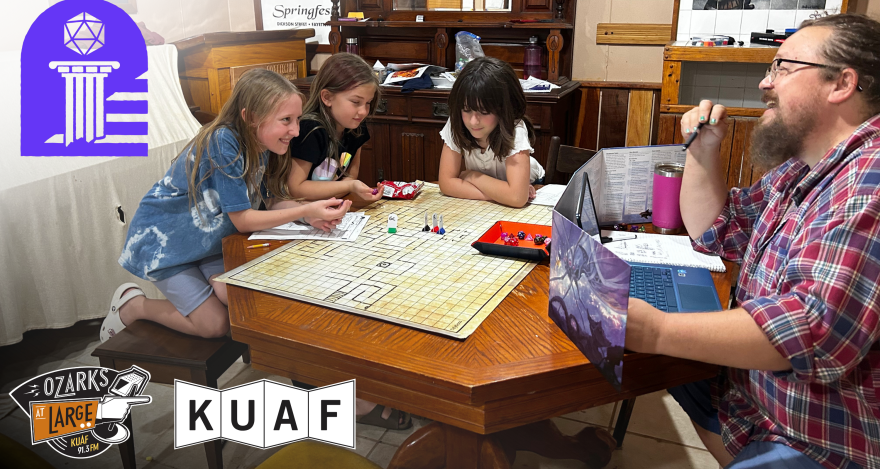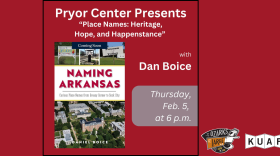The Ozark Mountain Smokehouse becomes a fantasy world for a few weeks each summer. Ozark Dice & Destiny transforms the space to host not just summer campers, but goblins, wizards and owlbears too. Every day, campers play the role-playing game Dungeons & Dragons for about 6 hours, with a break for lunch in the middle.
"We show up at nine, we get started at 9:30," Evan McDonald, founder of Ozark Dice & Destiny, said. "We have session A, which is one campaign. We do about three hours of that. We take a break for lunch, and we come back with session B, and it's a different campaign, three hours of that. So the challenge is to find enough dungeon masters."
A dungeon master is the person in charge of running a DnD session. They control the characters that players might encounter while navigating the world, be they friend or foe. On top of that, dungeon masters are the de facto referees and decide what players can or cannot do, usually by the roll of a 20-sided die.
Ozark Dice & Destiny enables campers, who are all elementary or middle school students, to take control of these little adventures and guide their peers through combat, social interactions and environmental threats.
"We have a lot of student dungeon masters, and then to make sure that the players themselves are swapped around, enough that they get wildly different experiences, and we encourage the dungeon masters to homebrew. I also have a collection of adventures, module adventures that they can run, but the day is actually surprisingly quick and surprisingly simple."
McDonald says that they really don’t do much more than play the game.
"The first year that I did the camp, I had so many things planned. I had guest speakers. We were going to be doing world-building, we were going to be doing crafts. And then Tuesday morning, the students, very kindly, sat me down and said, 'Stop it. We just want to play Dungeons & Dragons.'"
This desire is strong among kids participating in Ozark Dice & Destiny. This group of middle schoolers was taking a break from fighting a frost giant to enjoy some snacks and refreshments. When asked why they prefer spending their precious summer vacation at the camp, they had this to say:
"Oh, because DnD's freaking fun."
"You can play yourself, like, go on adventures. You can do pretty much everything you can't do in DnD, and it's fun."
"So yeah, honestly, I probably would have just lied in my room and watched YouTube all day if I hadn't.
"You know, the PS5, Nintendo Switch, or watching YouTube all day. Yeah."
Playing Dungeons & Dragons is the main draw for everyone there, kids and adults alike.
Outside of the summer camp, McDonald works at Washington Elementary School. He started an after-school Dungeons & Dragons club at Washington and kicked off the summer camp after classes ended. He says he pursued both the club and the camp because he loves to play the game and appreciates what it can do for children. He began his journey with DnD just before the pandemic, dungeon mastering a few games for his colleagues. Once in lockdown, he turned to his family.
"And my wife is very supportive of the hobby, but not particularly interested. So I had to turn to my children. And my daughter was two when we started to play, so I had to simplify the game pretty quickly. And once things opened up again, and certainly at Washington Elementary, I floated the idea of doing an after-school program there for DnD, and it really took off from there."
Now, four years later, McDonald is looking to expand Ozark Dice & Destiny’s offerings. And he’s enlisted the creative mind of Christopher Spencer to aid him in his quest. Spencer, a Fayetteville local, has been playing and running DnD games since the 1980s, back when the public viewed the game … less favorably than it does now.
"There were some, there were some older boys there who had Advanced Dungeons & Dragons. And I was just fascinated with that book. And my friends and I just over a summer, over a year, you know, kind of learned to play the game as best we could, and rolled some dice. And I was just fascinated by it and the way it opened up my ability to be imaginative. But like, have some rules around it, so, like, there's a little bit of structure. And pretty soon, I want to say, within a couple of months, I was starting to write my own adventures, getting in trouble at school for writing my own adventures. It was back during the dark days of the Satanic Panic. So anytime you created a map that had anything about kobolds in it, you might have to have your parents sign it to let them know that you were engaging in that kind of occult activity. I'm joking, but actually, I'm not joking about that. that actually did happen. But yeah, you know, I started creating adventures. And what I was so fascinated by was, like, I could come up with a scene, and my friends would actually listen to me, and I was like, kind of in control, and I can make things happen."
And he’s continued to make things happen. He became a lifelong storyteller, as a newspaper reporter, communications professional and, of course, a dungeon master. Today, he’s joined forces with McDonald to form a creative partnership aiming to publish content for players of all ages.
"I started Ozark Dice & Destiny with that first year of after-school programs and the first year of the summer camp. And the thing that I really appreciated when Christopher reached out was, I don't get a lot of opportunities with the summer camp and the after-school program to speak to, you know, other adults about the game."
Together, they want to publish zines, short DIY-style booklets, of original adventures that draw inspiration from classic fantasy and Ozark folklore, and sell them at local stores.
"One of the things that I'm very interested in is publishing adventures that other people can run through. I'm really fascinated by the zine format, and that way that the you can have a lower, you know, risk in terms of publishing, but like, do things that are kind of innovative and crazy."
Spencer says that the adventures will use Dungeons and Dragons rules while utilizing their own original content to create the story. This is possible because of a tool called the System Reference Document. According to Wizards of the Coast, the company that owns Dungeons & Dragons, the SRD contains DnD rules that anyone can use and reference to publish content under Creative Commons.
The purpose of the SRD is to “provide a foundation of Dungeons & Dragons content on which third-party publishers can build their products. It allows creators to reference and use the base game rules of Dungeons & Dragons in their products without the need to pay a licensing fee to Wizards of the Coast.”
Wizards of the Coast created the SRD because creating non-official Dungeons and Dragons-style games has been around since the beginning of tabletop role-playing games. Furthermore, McDonald and Spencer note that zines have also had a significant influence on the game’s past, and they anticipate that impact to continue.
"As the genre started to take shape between David Arneson and Gary Gygax and that whole crew that we're kind of putting together, and that was, that was very play by post. I mean, what I mean is like, you know, you may send a piece of a piece of mail between each other, but, yeah, you're talking about conversations that occurred in magazines, correct?"
"So these zines would come through the mail. You would sign up. You would pay a subscription for them. They would be niche to your hobby. And well before message boards were commonplace, and then certainly before any kind of social media, obviously, this is how you would zero in. And so what became that Dungeons & Dragons niche grew out of war games, tabletop games, those kind of chain mail era, and then moving forward, the conversation just continued into what is this thing that TSR is doing? What's this thing that Gary Gygax is publishing, and people were having heated conversations about these things, including whether or not you could speak about your character in the third person or not, whether or not you said, like, you know, I attempt to leap the chasm, or if it's like, you know, Gragnar the Magnificent attempts to leap the cavern every single time. And you had people taking very strong stances all through these subscription zines."
JT: So y'all are trying to tap back into that?
"I think, you know, as we look back 50 years in this hobby, there are wonderful things that emerge in the beginning. There's some things that aren't so great too— I'm not going to get into it— but there's some things that are back there that we don't want to bring forward. I think right now, we've got this wonderful place where we can be digital and analog at the same time. So finding the best of those mediums and putting down the screen when appropriate, and just pulling out the book is a lot of fun. So finding the sweet spot between those two mediums is part of what a good storyteller does."
As the pair of dungeon masters work on their zines, Ozark Dice & Destiny continues full steam. And while it may be the dice and dragons that pull kids in, what keeps them coming back and what catches the attention of educators is harder to quantify. McDonald says he sees Dungeons & Dragons as not just a game, but as a tool for achieving a key priority in today’s classrooms.
"One of the hot-button words in education right now is SEL: social-emotional learning. And it's all those things that you learn in school that aren't in the book. And it just so happens that so many of those skills are part of Dungeons & Dragons."
The game encourages growth without the usual classroom pressure. Kids learn collaboration, empathy, creative problem-solving, and resilience through in-game scenarios all without the risk of a grade.
"You might not be able to negotiate with the Goblin King one day, but you’re going to be able to negotiate with Susan the next day."
McDonald sees growth in kids every session. He says students with behavioral challenges or learning differences find comfort and often success in the structure of the game. DnD's built-in rhythm— combat, conversation, exploration— offers clear expectations and turn-taking that can be especially effective for neurodivergent students.
Spencers says people on the autism spectrum often thrive in that structure.
"Because it offers some formalized social rules, and so you don't have to kind of, like, play this, you know, weirdness that we, you know, we generally play. And you can be like, 'Okay, now is the combat time. Now is the exploration time. It is your turn. It is your turn. It is your turn.' And that structure is really helpful, I think, for particularly people who are kind of neurodivergent and they do find friends."
McDonald adds that even some students wish for their Dnd characters to be pacifists and reject the game’s traditional combat mechanics. He says he welcomes that playstyle and tailors the game to them.
"It's too easy to rely on the violence that's kind of inherent in the game. So you're thinking of palace intrigue, you're thinking of role playing itself, you're thinking of puzzles and mysteries and a million other ways that we already know those solutions, but we just have to find ways to implement them."
The demand for Ozark Dice & Destiny has grown quickly. What started as a single week of camp is now three, serving more than 40 students over the summer, triple the number from year one.
Parents discover the camp through social media or word-of-mouth, often without any connection to the local schools. McDonald says many kids arrive on Monday with no prior experience. By Friday, they’re telling stories, making friends, and begging to come back.
For Spencer and McDonald, the next chapter includes their upcoming zine series. They're also working to make the hobby more accessible for younger players and diverse audiences. Plus, Ozark Dice & Destiny has offerings past the club and camp, like Dungeons & Dragons birthday parties at Arkadia Retrocade. But the heart of it will always be the stories and the people who tell them together.
"There's a phrase when you're a dungeon master that you say a lot to maybe an overly ambitious player. You say, 'Well, you can certainly try.' And if I had one sentence, if I had one sentence fragment, I guess it's that. That's the message that I would give to the students and to their parents, that this is not as daunting as you might think it is, and is an excellent way for you to get to spend time together as a family, whatever that family may look like, and engaging in that creativity, your students are going to bring things to the table that you never would have thought of, and you're going to find things in those interactions that are going to make memories forever."
Ozarks at Large transcripts are created on a rush deadline. Copy editors utilize AI tools to review work. KUAF does not publish content created by AI. Please reach out to kuafinfo@uark.edu to report an issue.








